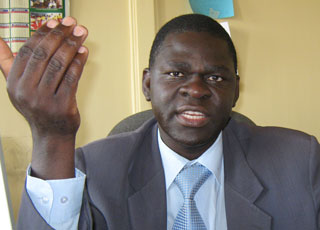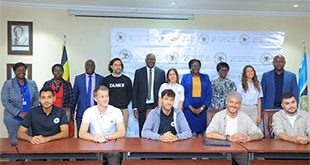
By Patrick Kagenda
The East African Common Market is scheduled to come into effect January 10, 2010. The Independent’s Patrick Kagenda talked to Abubaker Muhammad K. Moki, the assistant commissioner economic affairs at the Uganda ministry of East African Community Affairs.
Last month there were a series of documents signed by the East African ministers who converged in Kampala. What were these documents?
What was signed was the East African Common Market protocol. We are now in the second stage of the Common Market where we are supposed to have free movement of persons, labour and others. The negotiations for that protocol are now complete and it has been endorsed. The protocol is an agreement by the partner states regarding those issues.
Are all the partner states ready to implement the East African common market come 2010?
They are all ready but in a phased manner. Some people think that once they start to implement, then they are implementing everything at ago. It’s going to be like when you are building a house. You start with the foundation and the rest follow in different phases. They are ready and committed to implement but in a phased way.
What is the likely phase to be implemented first?
Issues related to the Customs Union dealing with the free movement of goods. The issue of free movement of persons will be automatic because as you are transporting your goods you are also moving freely. The other issue is of the mutual recognition of standards. There are aspects which are already being implemented but are being implemented through mutual understanding. People are asking about the right of residence; that one will take time.
Where does Uganda stand regarding the East African common market and its likely impact on the local manufacturing industry?
The Common Market is one huge regional market where there is free movement of persons, goods and businesses. Ugandan manufacturers need to improve their products in order to fit into the market. There is supposed to be no protectionism or trade barriers in the common market. The local manufacturers should identify areas where they are more competitive and specialise in them.
Tanzania had raised an issue on the right of establishment of businesses, has this been addressed?
Currently what has been stated is that we should be using national laws because there are things where people do not want to open up at once, like the local manufacturers who are saying they need more time to catch up with the other economies.
What is the advantage of the Common Market to the Ugandans?
There will be increased competition which will bring efficiency. In Uganda our firms have been competing amongst themselves but now they are going to compete regionally so in the process they will be more efficient. With the efficiency, the consumers will benefit from better products, services and costs will certainly come down.
How will the issue of land acquisitions in the partner states be handled?
The partner states said land is a very big issue and it has not been understood very well. They agreed on continuing to use the national laws regarding land acquisitions for investment purposes. However the national land laws also seem to have been harmonised because all the partner states have investment authorities that are one stop centres.
How is the issue of the regional travel document being addressed?
The East African passport was negotiated at the time when there were three partner states Uganda, Kenya and Tanzania. Then Rwanda and Burundi came on board. This meant adjusting the system to capture Rwanda and Burundi. The passport issue was already agreed upon before the common market and it’s a common market issue. It is also similar to the land issue because there were some misunderstandings over it and that’s when they opted for using national identity cards in spite of the fact that Uganda does not have one. I think we are also in the process of having a national ID.
There is talk that everything has been rushed into. Things that took the European Union 20 years to accomplish have taken less than three years in the case of the EAC. Is this true?
In the EAC, our integration is unique in a sense that it has a fourth stage. In most integration, it is just economic integration with the customs union, common market, monetary union without a political federation which we have as our ultimate goal. The source of our urgency resulted from an agreement that we fast track all the processes at ago. When we were at the customs union level, there were some aspects of the common market, monetary union, and the political federation that we are cooperating in. Defense cooperation falls under the political federation, yet we are already cooperating in that. People already have convertibility of the currencies. The ministers of finance have joint meetings; they agree on some fiscal policies, they have even agreed to read their budgets on the same day.
What follows after the Common Market is in place?
When we successfully conclude the Common Market Protocol and start its implementation come January 10, 2010, we will seriously start on the Monetary Union Protocol that is expected to be completed by 2012. The final signing of the protocol for the common market will be done by the heads of state in November this year.The protocol for the monetary union will follow and it will be followed by the protocol for the political federation.
 The Independent Uganda: You get the Truth we Pay the Price
The Independent Uganda: You get the Truth we Pay the Price


